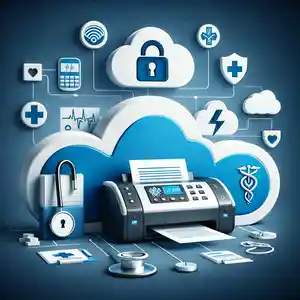 Ensuring the security of sensitive patient information is critical in the healthcare industry, especially when it comes to faxing. Compliance with HIPAA (Health Insurance Portability and Accountability Act) regulations is essential to protect patient data. Here are five tips to help your organization achieve HIPAA-secure faxing:
Ensuring the security of sensitive patient information is critical in the healthcare industry, especially when it comes to faxing. Compliance with HIPAA (Health Insurance Portability and Accountability Act) regulations is essential to protect patient data. Here are five tips to help your organization achieve HIPAA-secure faxing:
- Use Secure Online Cloud Fax Services
Traditional fax machines are prone to security risks, such as unauthorized access to physical documents. Switching to a secure online cloud fax service can mitigate these risks. These services use advanced encryption protocols to protect data during transmission and storage. Additionally, they offer user authentication and access controls, ensuring that only authorized personnel can send or receive sensitive information. - Encrypt All Fax Communications
Encryption is a crucial component of HIPAA compliance. Ensure that all fax communications, whether sent or received, are encrypted. This prevents unauthorized access to the data during transmission. Secure cloud fax services typically provide end-to-end encryption, ensuring patient information remains confidential and secure throughout the process. - Implement Access Controls and User Authentication
Restricting access to sensitive information is vital for maintaining HIPAA compliance. Implement access controls and user authentication measures to ensure only authorized staff can access, send, or receive faxes. This can include password-protected accounts, multi-factor authentication, and role-based access controls to limit who can view or handle sensitive patient data. - Maintain Detailed Audit Trails
Keeping detailed records of all fax communications is essential for HIPAA compliance. Secure cloud fax services offer audit trail features that log all faxing activities, including who sent or received a fax, the time and date of transmission, and the contents of the fax. These audit trails help ensure accountability and provide a clear record for compliance audits or investigations. - Educate and Train Staff on HIPAA Compliance
Ensuring that your staff understands HIPAA regulations and the importance of secure faxing practices is crucial. Conduct regular training sessions to educate employees about HIPAA compliance, the risks associated with faxing sensitive information, and best practices for using secure fax services. Regularly updating training materials and conducting refresher courses can help maintain a high level of awareness and adherence to compliance requirements.
Achieving HIPAA-secure faxing is essential for protecting sensitive patient information and maintaining regulatory compliance. By using secure online cloud fax services, encrypting communications, implementing access controls, maintaining audit trails, and educating staff, your organization can ensure the security and confidentiality of patient data. Embrace these tips to enhance your faxing practices and safeguard your organization’s reputation.
